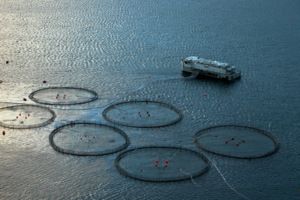News
Faroes the highest frequency coronavirus tester in the world
This article is more than 5 years old.

The Faroese salmon industry’s tribute to an Olympics that never quite happened (photo: Erik Christensen)
As the coronavirus outbreak spreads to almost every corner of the Earth – a BBC report today claims that just 18 countries, mostly in Oceania and Africa, don’t have a confirmed case yet – it turns out the Faroe Islands has been among the best equipped to combat the virus thanks to, of all things, salmon.
Dividends two decades later
Twenty years ago, the Faroese salmon industry was ravaged by an influenza, the ‘ISA-virus’, which wiped out about 90 percent of its salmon.
In response, an infrastructure for testing was introduced that included a laboratory and equipment.
Debes Christiansen, a geneticist at the Faroese Food Authority, had the idea in January to utilise these facilities for coronavirus testing purposes, and they have proven to be directly transferrable 20 years later.
Highest per capita rate
As a result, according to figures from the National Board of Health, about 8.3 percent of the Faroese population have been tested, making it the highest per capita for testing in the world.
In Denmark, approximately 0.4 percent have been tested.
Some 173 people have tested positive for COVID-19 in the Faroe Islands, and so far no Faroese have died from the infection – thanks in part to rapid detection and containment.










































